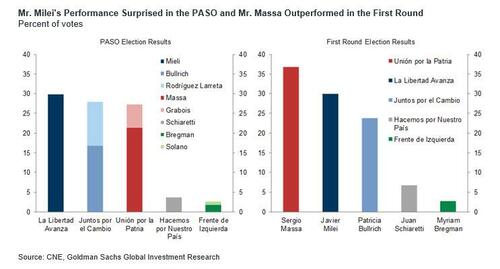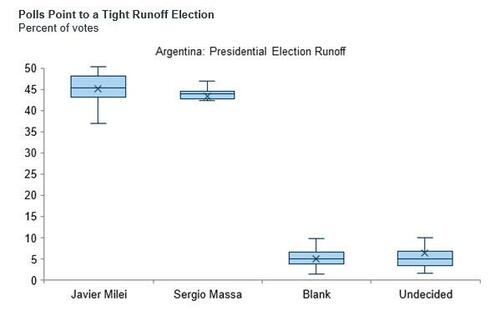from ZeroHedge:

Argentinians return to the polls on Sunday, November 19 to elect the next president in a consequential runoff election. Voters will choose between incumbent Finance Minister Sergio Massa and right-wing libertarian Javier Milei. The election results will shape Argentina’s social and macroeconomic outlook in coming years.
TRUTH LIVES on at https://sgtreport.tv/
Ep. 24 Argentina’s next president could be Javier Milei. Who is he? We traveled to Buenos Aires to speak with him and find out. pic.twitter.com/4WwTZYoWHs
— Tucker Carlson (@TuckerCarlson) September 14, 2023
As Goldman writes in its election preview note, polls point to a tightly contested race, with a majority showing Milei having a slight edge in voter preferences. A significant fraction (around one third of polls), however, suggests that Massa is in the lead. In general, polls in Argentina have a poor track record and in this electoral process they have systematically failed to capture shifts in voters’ sentiment. To add to the uncertainty, Massa was seen as outperforming Milei in the final presidential debate last week.

In the August primary elections (PASO), Javier Milei’s La Libertad Avanza party surprised by taking the lead, followed by the center-right coalition Juntos por el Cambio whose presidential ticket would be led by Patricia Bullrich. Massa’s left-leaning Peronist coalition, Unión por la Patria, finished third. In the October first round election, in turn, Massa topped most expectations with an improved performance and finished first. Milei came in second place without a significant change in support, and Bullrich disappointed and finished a distant third.
After the first-round election, part of the Juntos por el Cambio coalition, the faction led by Ms. Bullrich and former President Mauricio Macri, announced their support for Mr. Milei. While the bloc represented by the Radical Party decided not to formally endorse any of the candidates, some members have publicly sided with Mr. Massa.
Following Sunday´s results, investors will turn their attention to economic policy announcements. In the short term, the highly managed exchange rate will be a critical variable to follow. After the August primary elections, the government weakened the exchange rate by about 22% to 350 ARS per Dollar. Subsequently, the exchange rate was kept frozen at this level until this week, when a crawl resumed (1.0% so far this week). Nevertheless, pass-through was high and inflation accelerated considerably after the post-PASO devaluation and as a result, the real exchange rate is now even more overvalued than before the August devaluation.




 HUGE SILVER REVEAL: Unbelievable SHOCKING Price Predictions for 2025 You Can’t Afford to Miss!
HUGE SILVER REVEAL: Unbelievable SHOCKING Price Predictions for 2025 You Can’t Afford to Miss! 
